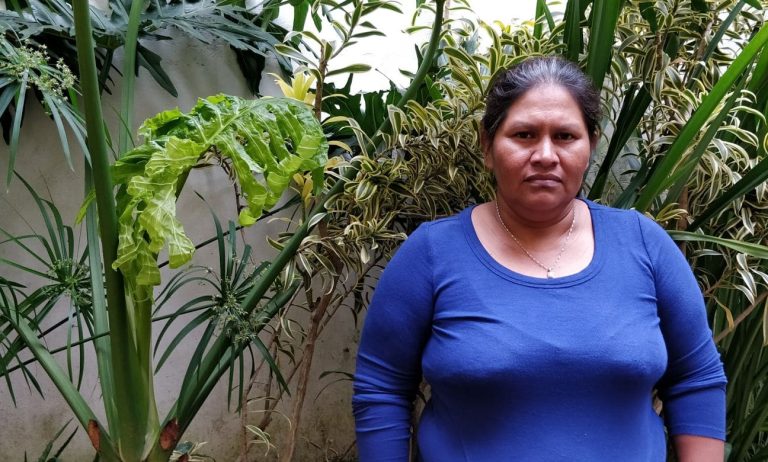7 de junio 2022

Children of Exile: The Births “Sowing Hope” in the Camp of Nicaraguan Farmers

PUBLICIDAD 1M
PUBLICIDAD 4D
PUBLICIDAD 5D
Ramirez She is one of 40 Nicaraguans that will participate in events parallel to the Summit of the Americas

Ramirez She is one of 40 Nicaraguans that will participate in events parallel to the Summit of the Americas
Rural leader Francisca “Chica” Ramírez will denounce the intensification of repression in Nicaragua and demand greater international pressure on Daniel Ortega to release his 180+ political prisoners. She will also call for a return democracy in her country during a civil society event to be held alongside the Summit of the Americas that began on Monday, June 6, in Los Angeles, California.
Ramírez, exiled in Costa Rica since 2018, points out that “many things have been said, but have not been done,” in reference to the urgency of concrete actions that will bring down the Ortega Murillo regime. “Daniel Ortega remains empowered; it seems that he has not felt much pressure. So, we need to have mechanisms to put pressure on such as the Nica Act and others,” she said.
Although international attention has been focused on whether Mexico will attend the Summit, after President Andres Manuel López Obrador conditioned his participation to the invitation of Cuba, Nicaragua and Venezuela, for Ramírez the event is an opportunity of convergence between sectors of the Nicaraguan opposition and the diaspora.
The leader will share her points of view on the repression suffered by the peasants under Ortega’s oppression and the imprisonment of their main leaders. Just over 40 Nicaraguan opposition and diaspora members will participate, where they will also talk about how the country reached a deplorable situation in democratic terms.
Ligia Gomez, spokesperson and researcher for Urnas Abiertas, will be in charge of the presentation “Nicaragua and the extinction of democracy,” through which she will denounce how democratic channels in the country have been eradicated by the regime. “The 2021 electoral fraud led to the establishment of a de facto government that has deepened the human rights and political crisis,” she expressed.
Gomez, former official of Nicaragua’s Central Bank, said the call to the official missions participating in the Summit is “to elaborate a realistic strategy that transcends such a superficial issue as an invitation.” She explained that due to the way that the Summit is organized, specific problems such as the case of Nicaragua are not addressed, but rather regional issues. Governance is part of the meeting’s agenda, but it is very likely that it will be focused on overcoming the challenges at the level of democracy in the continent,” she noted.
“Our call is to joint bilateral, multilateral, regional efforts to be able to solve the crisis,” Gómez expressed.
Amaru Ruiz, representative of the Red Local organization and focal point of the Foro Ciudadano de las Americas in Nicaragua, will be responsible to present in the hemispheric meeting the obliteration of freedom of association in the country, evident in the banning of 452 non-profit organizatons from 2018 to date.
He explains that the purpose of the Focal Point at the Summit is not to influence at the political level, but rather in the “formal part” of the event, which means that in the Summit’s final document, the realities that affect other countries are mentioned, but also that they coincide with the problem faced by Nicaragua.
Although Ruiz knows that some civil society groups will have bilateral meetings with various authorities of other countries. However, he thinks that “there is little ambience to touch on the subject of Nicaragua at the official part,” due to the debate generated over the presence or not of Cuba, Venezuela and Nicaragua produces certain susceptibility in other countries of the hemisphere. “What I feel is that this issue is forbidden, so why make an effort of if, from the outset, the countries do not want to take a stance from an ideological point of view with certain groups, countries,” he questioned.
However, Ruiz pointed out that one of the great achievements of this Summit is the participation of dozens of Nicaraguans from civil society, which had not happened in the past. “This generates expectations of the capacity to influence that Nicaraguan society has on the official delegates as well as on the governments,” he said.
Likewise, the Legal Defense Network, made up of organizations from Nicaragua, Costa Rica and the United States demanded, through a letter, that the delegates participating in the Summit pay attention to the crisis in Nicaragua, in which the exercise of freedom of the press has become “a crime,” persecuting journalists and forcing them into exile.
The organization Periodistas y Comunicadores Independientes de Nicaragua (Independent journalists and communicators) registered 1,520 attacks of different types against journalists and independent media in 2021. For this reason, Nicaragua was placed in the “red zone” of the ranking prepared by Reporters Without Borders. It occupied position 121, falling four positions compared to 2020. Freedoms have been infringed by repressive laws that have raised the levels of self-censorship in a country that continues to expel migrants seeking better life opportunities.
This article was originally published in Spanish in Confidencial and translated by Havana Times
Archivado como:
PUBLICIDAD 3M
Confidencial es un diario digital nicaragüense, de formato multimedia, fundado por Carlos F. Chamorro en junio de 1996. Inició como un semanario impreso y hoy es un medio de referencia regional con información, análisis, entrevistas, perfiles, reportajes e investigaciones sobre Nicaragua, informando desde el exilio por la persecución política de la dictadura de Daniel Ortega y Rosario Murillo.
PUBLICIDAD 3D